- Home
- Donis Casey
Forty Dead Men Page 12
Forty Dead Men Read online
Page 12
“Honey, I am not letting you go to that affair without me.”
Chapter Eighteen
Holly did not like the idea of remaining at the Tucker farm longer than she already had, but she didn’t know what else to do. Still, Alafair had gone to Okmulgee, Shaw was staying with his aunt in Muskogee in order to be close to Gee Dub, and the three youngest Tucker girls had moved in with their sister, Mary, while Alafair was away. Scott offered to give Holly a free room at the American Hotel, which was run by his wife, Hattie, but Holly didn’t feel right about accepting charity from the lawman. He had been nothing but kind to her, but she suspected he still had his doubts about her involvement in a murder. Martha McCoy only had one bedroom in her apartment over the offices of the McCoy Land and Title Company. Phoebe Day had a tiny farmhouse and three tiny children. Ruth Tucker lived in a big house with many bedrooms, but it wasn’t hers to offer. But Alice Kelley had an extra bedroom, an accommodating husband, and only one cheerful two-year-old to manage, so she was happy to invite Holly to be her guest.
Holly liked Alice. She was a tall, pretty, pale blonde who dressed like an illustration in a fashion magazine. She was also refreshingly blunt and impossible to insult. Her husband, Walter, was friendly to the point of being a flirt, but since he behaved this way right in front of his wife, Holly figured it was just his manner. Alice didn’t seem bothered by it. Their little girl, Linda, was delightful—dark-eyed and dark-haired like her father, but her willful yet good-natured manner was her mother all over.
On the day after Alafair left for Okmulgee, Alice, with Linda in tow, drove Walter’s Model T out to the farm to ferry Holly and her few belongings into town. Holly threw her carpetbag into the back and settled into the shotgun seat. Linda climbed into her lap like it was her due. The trip to Boynton over the unpaved roads was dirty, jostling, and noisy, but that didn’t keep Alice from chatting nonstop as she drove. Later, Holly could not remember one thing Alice said to her, just that none of it had to do with the murder or with Holly’s dilemma. In fact, the whole conversation was blessedly one-sided and Holly was able to listen with one ear, not think much, and enjoy the warm feel of the little girl in her lap.
When they reached Boynton, Alice pulled the auto into an open bay at the S.B. Turner Livery and Garage at the end of the main street into town. They were met by a man of some years who, despite his bright hazel-green eyes, was obviously Indian. Holly slid out of her seat with Linda in her arms.
“Good morning, Mr. Turner,” Alice said. “How are you today?”
The little man greeted her with a wide smile. “I’m just fine, Alice. How are y’all?”
“Well as can be expected, Mr. Turner. I was wondering if you would give the auto a going-over? We’ll be using it to drive to Muskogee directly.”
The smile disappeared. “Well, sure, honey. I was mighty sorry to hear about Gee Dub’s troubles. How is that going?”
“The hearing is tomorrow. Daddy has been in Muskogee ever since they arrested Gee Dub. Mama’s in Okmulgee right now, trying to find some evidence that’ll clear him. Even if he has to go to trial, Mr. Meriwether is pretty sure the judge will set bail. I don’t know if he’ll be able to come home then, or if he’ll have to stay in Muskogee. I’ll have to ask Walter how it works.”
Mr. Turner extended a hand across the hood to Holly. “Are you the young lady who has caused all this trouble?”
The old man smiled when he said it and his tone was perfectly pleasant, but Holly was shocked that he would say such a thing to her. She managed to eke out an incoherent noise, but Alice came to her rescue before she had to think of a response.
“This is Miz Holly Thornberry, Mr. Turner. She traveled all the way down here from Maine looking for her husband.”
Turner nodded. “Stories galore are flying around town about what happened. Folks are saying that Gee Dub came back from the war a changed man. That he beat that feller down in Council Hill to death with his bare fists for what he did to Miz Thornberry. Or that he rode down to Council Hill and shot the man’s head clean off.”
Alice’s expression hardened. “Mr. Turner, Gee Dub hasn’t even been charged with anything yet. It’s just a coincidence that he was in Council Hill at all on the day Mr. Johnson was killed. Believe me, what I hear of Johnson, he was the kind of man who would have had folks lining up to shoot him. I don’t appreciate whoever is spreading gossip about my brother, so don’t you listen to them. Near to everyone in this town has known Gee Dub since he was born, and I can’t imagine that one single person could ever think he’d kill somebody like that.”
S.B. Turner was not as chastened by Alice’s scolding as she might have hoped. “Honey, you know my boy Johnny was over there in Europe, too, and if Gee Dub lived through half the horrors that Johnny described to me and his ma after he came back, well, that would make a killer out of anybody.”
“Not Gee Dub.” Alice’s expression said that was all there was to it.
S.B. nodded. There was no point in arguing. “If the lad does get indicted, I reckon half the town will head over to Muskogee to attend the trial. Like you said, Gee Dub is one of ours, and folks stand by their own.”
“I appreciate that, Mr. Turner.”
S.B. turned his attention to Holly in an attempt to lure her into the conversation. “I hear that your man stole another fellow’s identification papers and commenced to living his life.”
Holly shifted Linda to her other hip. “That seems to be what happened.” She had no desire to expound.
“Maybe they traded papers,” S.B. speculated. “Maybe they both thought to exchange lives.”
“Considering that Johnson was wanted for manslaughter and on the run, that wouldn’t be much of a trade for Mr. Stump,” Alice pointed out.
S.B. was enjoying the topic of conversation far too much. “So it’s true that the dead soldier Clell Rogers found by the side of the road back in December was the one whose life got stole?”
Holly could practically see the wheels turning in Mr. Turner’s head as he stored each little bit of information they gave him for later distribution to the citizens of Boynton.
Alice seemed eager to set the record straight rather than let the local gossip mill churn out its own story. “That’s him. Name of Harvey Stump. The poor fellow had inherited some property down in Council Hill, but he didn’t have any family still living after he got out of the service. Nobody reported him missing.”
“So where was this Dan Johnson from before he decided to go down to Council Hill and become Mr. Stump?”
“He was born and raised in Okmulgee,” Alice said. “His folks still live there. They thought, along with everybody else, that he was dead, and here he was living not thirty miles away from them.”
Mr. Turner’s expression had changed while Alice was talking. “He was headed to Okmulgee?”
“That’s right.”
“And this was in December?”
Both Alice and Holly noticed the difference in Turner’s tone and exchanged a glance. Alice said, “Mid-December, I think. I don’t know the exact date, Mr. Turner, but Scott would. Why?”
Turner held up a finger to pause the conversation. He rummaged through a stack of papers on the makeshift desk beside the open garage door, came up with a ledger, and thumbed through it. He was running his index finger down a page when he said, “There was a fellow came through here on December 15th last year who rented a horse. He said he just needed it for two days to look at some property out in the country up around the Boynton Pool. Gave his name as Will Callahan. He paid ahead of time with cash money and left a big deposit on the horse, to boot, but he never came back. I reported the horse and tack stolen, and Scott wired most of the law around here to be on the lookout. It was near to two weeks before they found that horse in Okmulgee. The thief had sold it to somebody who didn’t much care if the man he bought it off actually owned it. A sharp-eye
d policeman saw the mare tied up outside a roadhouse and recognized the brand. I sure was glad to get that nag back. She’s a good one, worth a lot of money.”
“Did they find out what happened to the thief?”
“Naw. He just disappeared, and as long as I got Belle back, I didn’t care to pursue it.”
“Mr. Turner, was this man who rented the horse a soldier?” Holly said.
Turner seemed surprised to hear her speak. “Well, he wasn’t in uniform. Had on a gray vest and a white shirt. Not very tall. Dark hair.”
Holly removed the photo case from her handbag and held it out for Turner’s inspection. “Is this him?”
Turner took the picture from her and scrutinized it closely. “Well, my word! I do believe that it is.”
“Mr. Turner,” Alice said, “you’d better tell Scott about this.”
***
Scott looked up from Mr. Turner’s ledger at the three people standing in front of him. “I had forgot about that stolen horse, S.B., but I should have put two and two together. I do remember that the fellow in Okmulgee who bought your mare said that he got her from a man at the very roadhouse where the police spotted her. He couldn’t say more than that the man was young and called himself Will, but it looks like Will Callahan is really our Daniel Johnson. And if that is so, then instead of renting two horses or a buggy and going back to retrieve his ailing partner, Johnson lit out and left him to die beside the road. So Johnson went from here to Okmulgee before he took up residence in Council Hill and started calling himself Harvey Stump. The question is, why on Earth did Johnson go to Okmulgee, and who did he see while he was there?”
Holly’s cheeks reddened as she listened to Scott ruminate aloud. If what he was saying was true, then Dan had lied to her yet again. She had begged Gee Dub not to tell anyone about their trip to Council Hill, but it was apparent to her now that once again she had behaved foolishly. “Sheriff Tucker,” she said, “can I talk to you in private?”
Chapter Nineteen
Charles Tucker was used to taking charge of any situation, and it took some argument for Lavinia and Alafair to convince him it would be best to let them pursue their investigation quietly. Charles was a well-known figure around town and for him to show up at a stranger’s funeral would be an occasion for comment. He was too intrigued to allow himself to be completely left out, though. So the three of them devised a plan whereby Charles would drive Lavinia and Alafair to the church at the corner of Seminole and Seventh and remain outside during the funeral. Then, if all went as expected, he would chauffeur the women to the cemetery, where they could all observe the burial from a distance. As for the post-burial reception, the most unobtrusive thing they could come up with was to park at the end of the street from the Johnson house and watch the “mourners” come and go.
Alafair and Lavinia waited until the service had begun before they slipped into the church and took a seat in a back pew. The plain pine coffin was situated at the front, under the pulpit. Alafair could only see the tip of a nose peeking up over the edge. She counted twenty people in the pews. Alafair expected it was only kinfolks who had come, and close family friends who could not otherwise get out of it. After the war and the massive death toll of the flu epidemic the previous year, everyone was funeraled out. From where she was sitting, Alafair could only see the backs of the family’s heads. She leaned close to whisper in Lavinia’s ear. “I can’t tell anything about Johnson’s folks from here.”
“We’ll get a look at them when we file by the coffin at the end of the service,” Lavinia whispered back.
The preacher took the opportunity to try and convert any non-believers in the audience. He did not have much to say about the deceased. After the sermon Alafair and Lavinia followed the tiny congregation up the aisle to view the body and express sympathy to the bereaved.
The two women were last in line. Alafair took a long moment to observe the earthly remains of Daniel Johnson, who had caused such grief both in his life and in his death. The embalmers had only done a fair to middling job. The corpse had on too much makeup and the dark hair was parted in the middle and shiny with oil. His face looked a little lopsided. He did resemble the man in the photograph that Holly had shown her.
Alafair turned from the coffin to offer a hand and comforting words to the family. And finally get a good look at them.
Six people were sitting in the first row; two older couples, a young woman, and slightly removed, a younger man. The only people who looked like they had shed a tear was one of the older couples. Alafair pegged them as Dan’s parents. The mother, if that’s who she was, seemed to be nearly collapsed with grief. Her color was terrible, almost gray, and she was skeletally thin. The father looked distracted, as though he’d rather be anywhere but here. The other older couple were the widow’s parents, judging by their solicitous manner toward the young woman. The girl’s mother only had eyes for her daughter, but the man’s face was like a thundercloud, dark and angry. The young woman, Dan’s legal widow, Alafair expected, was a thin, fair-haired creature, almost fairy-like. Her black dress emphasized her white skin. She seemed confused, for which Alafair could not blame her. Discovering that your husband was alive when you thought he was dead, and then dead so soon after you find out he had been alive all along, would confuse and dismay anyone. As for the young man at the end of the pew, Alafair could not guess. A brother? The fiancé?
Alafair leaned down to offer a hand to the widow, who took it. The young woman’s hands were cool and dry. She accepted Alafair’s condolences with a somber, slightly curious expression that said, Who are you, now? Alafair responded with a smile, as though it was perfectly natural that she be there.
She and Lavinia circled back to their seats at the rear of the sanctuary. The preacher announced that there would be a gathering after the burial at the home of the dearly departed’s parents, then the family filed down the aisle and out of the church.
Lavinia waited until the sanctuary was empty before she stood up. “Charles is outside, waiting to drive us out to the cemetery. We’d better get a move on if we aim to follow the funeral procession and see what we can see.”
Chapter Twenty
Holly settled into the chair across the desk from Scott Tucker. The constable was gazing at her with an odd expression in his blue eyes. Curiosity? Suspicion? “I didn’t want to tell you what happened the day Dan was killed, Sheriff Tucker, for fear you’ll think my story makes me or Gee Dub look guilty. But we aren’t. I did go to Council Hill. I hitched a ride on a truck with a delivery man. He dropped me off in front of the general store that is also the post office and the postmaster directed me to Harvey Stump’s house. It wasn’t but a couple of blocks away but it took me a little while to limp over there. I knocked on the front door and there was no answer for a long time, so I peeked in the window and saw a man lying on a chaise. He was smoking a cigarette. He had to have heard me knocking.” She swallowed and her gaze flitted away. “He lifted up his head and looked at me. It was Dan.
“I went down there because I thought I had to know why he shamed me. But when I saw it really was him, all I wanted to do was get out of there. He recognized me right away and came tearing out the front door before I could get away. He grabbed my arm and clapped a hand over my mouth. I was scared, Sheriff. I was afraid he was going to hurt me, that he was going to panic because he had been found, and kill me or something. But that’s not what happened at all. He took me inside and calmed me down, and we talked for almost an hour.
“He told me that he was sorry for the way he treated me. He said that he didn’t mean to kill that man in Baltimore. They were fighting and the man fell and hit his head on the bar’s marble countertop. Dan got scared and deserted. He planned to go up to Canada and disappear. He told me that he rode the rails at night to avoid the military police. He was panhandling outside the train station in Harrisburg when Harvey Stump offered to buy him a mea
l, and they got to talking. Harvey mentioned that he was from Council Hill, so close to Okmulgee, and that both his parents had died in the flu epidemic and had left Harvey quite a bit of money. So Dan saw an opportunity. He told Harvey that his name was Will Callahan. He said that his mother was real sick and if Harvey could see his way clear to loan him the price of a train ticket to Okmulgee, maybe he could make it home to see her one last time before she passed. Harvey said he’d be glad to do it. Dan told me he’d never known anybody like Harvey, that he was a truly good man, and he’d never met a truly good man before.”
Holly hesitated. As she said it aloud, she heard for the first time what Dan’s tale must sound like to someone who wasn’t there.
Scott prompted her to continue. “But that’s not the way it happened, is it?”
Holly’s gaze drifted away. “No. Dan said that by the time they had to change trains in Muskogee, Harvey wasn’t feeling so well and with the flu scare still going on the stationmaster wouldn’t let him board. Dan didn’t leave him, though. He had already had the flu while he was overseas. They found a farmer hauling hay to his place near Boynton and paid him to let them ride in the wagon bed. The plan was that when the farmer dropped them off at the crossroads outside Boynton, Dan could walk the last half-mile into town and rent a buggy for the rest of the trip to Council Hill. Dan told me that by the time he got back to where he left him, Harvey had died. He said he lost his nerve after that. He stole Harvey’s ID, went to Council Hill and became Harvey Stump. Everybody in town just accepted that he was who he said he was, so he resolved to put his old life behind him and start anew.”
Holly took a breath, wondering how much more she needed to say. I’m a weak man, Dan had told her. All my life I been nothing but a disappointment to my parents and to anyone who ever loved me.
“Did you ever love me?” he had asked her, and she had not been able to answer. “Dan Johnson is dead,” he said to her then. “What good would it do to bring him back to life? My parents are used to me being gone. Pearl has moved on with her life and so should you. Believe me, you’re both better off without me.”

 The Wrong Girl
The Wrong Girl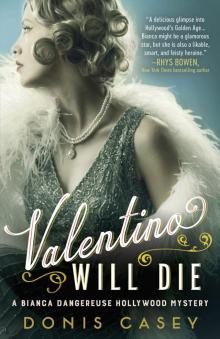 Valentino Will Die
Valentino Will Die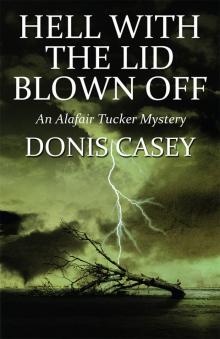 Hell With the Lid Blown Off
Hell With the Lid Blown Off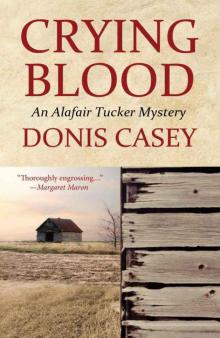 Crying Blood - An Alafair Tucker Mystery
Crying Blood - An Alafair Tucker Mystery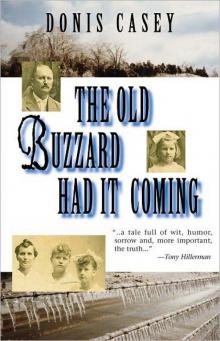 The Old Buzzard Had It Coming: An Alafair Tucker Mystery
The Old Buzzard Had It Coming: An Alafair Tucker Mystery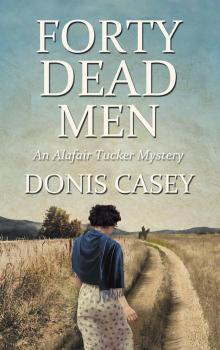 Forty Dead Men
Forty Dead Men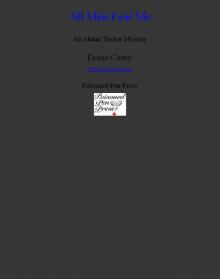 All Men Fear Me
All Men Fear Me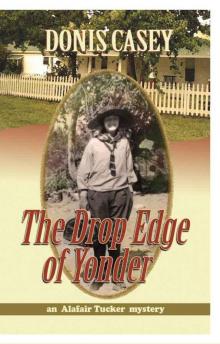 The Drop Edge of Yonder - An Alafair Tucker Mystery
The Drop Edge of Yonder - An Alafair Tucker Mystery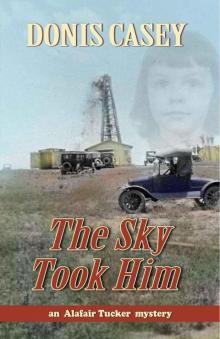 The Sky Took Him - An Alafair Tucker Mystery
The Sky Took Him - An Alafair Tucker Mystery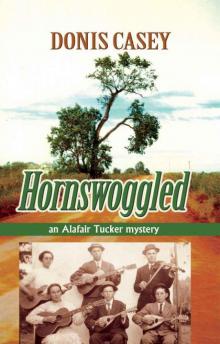 Hornswoggled - An Alafair Tucker Mystery
Hornswoggled - An Alafair Tucker Mystery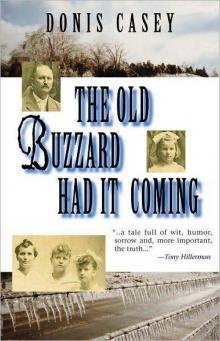 The Old Buzzard Had It Coming
The Old Buzzard Had It Coming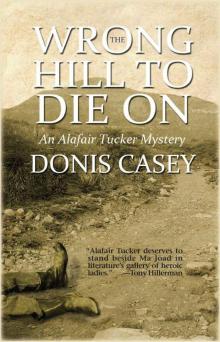 The Wrong Hill to Die On: An Alafair Tucker Mystery #6 (Alafair Tucker Mysteries)
The Wrong Hill to Die On: An Alafair Tucker Mystery #6 (Alafair Tucker Mysteries)